高英课文翻译2
高级英语lesson2原文及其翻译
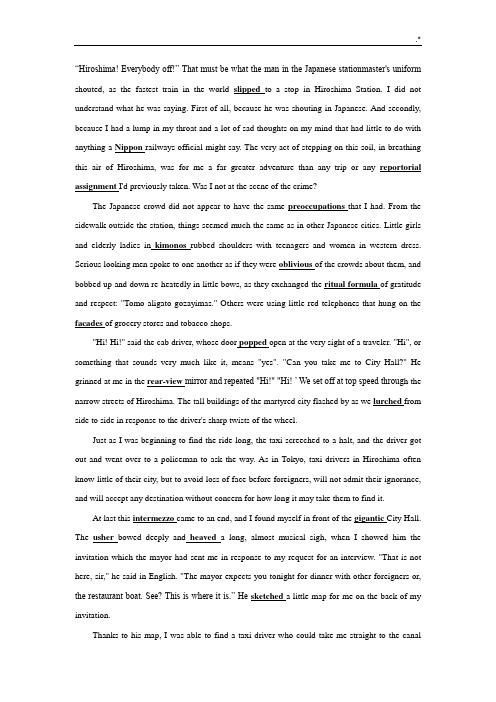
“Hiroshima! Everybody off!” That must be what the man in the Japanese stationmaster's uniform shouted, as the fastest train in the world slipped to a stop in Hiroshima Station. I did not understand what he was saying. First of all, because he was shouting in Japanese. And secondly, because I had a lump in my throat and a lot of sad thoughts on my mind that had little to do with anything a Nippon railways official might say. The very act of stepping on this soil, in breathing this air of Hiroshima, was for me a far greater adventure than any trip or any reportorial assignment I'd previously taken. Was I not at the scene of the crime?The Japanese crowd did not appear to have the same preoccupations that I had. From the sidewalk outside the station, things seemed much the same as in other Japanese cities. Little girls and elderly ladies in kimonos rubbed shoulders with teenagers and women in western dress. Serious looking men spoke to one another as if they were oblivious of the crowds about them, and bobbed up and down re-heatedly in little bows, as they exchanged the ritual formula of gratitude and respect: "Tomo aligato gozayimas." Others were using little red telephones that hung on the facades of grocery stores and tobacco shops."Hi! Hi!" said the cab driver, whose door popped open at the very sight of a traveler. "Hi", or something that sounds very much like it, means "yes". "Can you take me to City Hall?" He grinned at me in the rear-view mirror and repeated "Hi!" "Hi! ’ We set off at top speed throug h the narrow streets of Hiroshima. The tall buildings of the martyred city flashed by as we lurched from side to side in response to the driver's sharp twists of the wheel.Just as I was beginning to find the ride long, the taxi screeched to a halt, and the driver got out and went over to a policeman to ask the way. As in Tokyo, taxi drivers in Hiroshima often know little of their city, but to avoid loss of face before foreigners, will not admit their ignorance, and will accept any destination without concern for how long it may take them to find it.At last this intermezzo came to an end, and I found myself in front of the gigantic City Hall. The usher bowed deeply and heaved a long, almost musical sigh, when I showed him the invitation which the mayor had sent me in response to my request for an interview. "That is not here, sir," he said in English. "The mayor expects you tonight for dinner with other foreigners or, the restaurant boat. See? This is where it is.” He sketched a little map for me on the back of my invitation.Thanks to his map, I was able to find a taxi driver who could take me straight to the canalembankment , where a sort of barge with a roof like one on a Japanese house was moored . The Japanese build their traditional houses on boats when land becomes too expensive. The rather arresting spectacle of little old Japan adrift adrift amid beige concrete skyscrapers is the very symbol of the incessant struggle between the kimono and the miniskirt.At the door to the restaurant, a stunning, porcelain-faced woman in traditional costume asked me to remove my shoes. This done, I entered one of the low-ceilinged rooms of the little floating house, treading cautiously on the soft matting and experiencing a twinge of embarrassment at the prospect of meeting the mayor of Hiroshima in my socks.He was a tall, thin man, sad-eyed and serious. Quite unexpectedly, the strange emotion which had overwhelmed me at the station returned, and I was again crushed by the thought that I now stood on the site of the first atomic bombardment, where thousands upon thousands of people had been slain in one second, where thousands upon thousands of others had lingered on to die in slow agony .The introductions were made. Most of the guests were Japanese, and it was difficult for me to ask them just why we were gathered here. The few Americans and Germans seemed just as inhibited as I was. "Gentlemen," said the mayor, "I am happy to welcome you to Hiroshima."Everyone bowed, including the Westerners. After three days in Japan, the spinal column becomes extraordinarily flexible."Gentlemen, it is a very great honor to have you her e in Hiroshima."There were fresh bows, and the faces grew more and more serious each time the name Hiroshima was repeated."Hiroshi ma, as you know, is a city familiar to everyone,” continued the mayor."Yes, yes, of course,” murmured the company, more and more agitated."Seldom has a city gained such world renown, and I am proud and happy to welcome you to Hiroshima, a town known throughout the world for its--- oysters".I was just about to make my little bow of assent, when the meaning of these last words sank in, jolting me out of my sad reverie ."Hiroshima –oysters? What about the bomb and the misery and humanity's most heinous crime?" While the mayor went on with his speech in praise of southern Japanese sea food, I cautiously backed away and headed toward the far side of the room, where a few men were talkingamong themselves and paying little attention to the mayor's speech. "You look puzzled," said a small Japanese man with very large eye-glasses."Well, I must confess that I did not expect a speech about oysters here. I thought that Hiroshima still felt the impact of the atomic impact .""No one talks about it any more, and no one wants to, especially, the people who were born here or who lived through it. "Do you feel the same way, too?""I was here, but I was not in the center of town. I tell you this because I am almost an old man. There are two different schools of thought in this city of oysters, one that would like to preserve traces of the bomb, and the other that would like to get rid of everything, even the monument that was erected at the point of impact. They would also like to demolish the atomic museum.""Why would they want to do that?""Because it hurts everybody, and because time marches on. That is why." The small Japanese man smiled, his eyes nearly closed behind their thick lenses. "If you write about this city, do not forget to say that it is the gayest city in Japan, even it many of the town's people still bear hidden wounds, and burns."Like any other, the hospital smelled of formaldehyde and ethere . Stretchers and wheelchairs lined the walls of endless corridors, and nurses walked by carrying Stretchers instruments, the very sight of which would send shivers down the spine of any healthy visitor. The so-called atomic section was located on the third floor. It consisted of 17 beds."I am a fisherman by trade. I have been here a very long time, more than twenty years, "said an old man in Japanese pajamas. “What is wrong with you?”"Something inside. I was in Hiroshima when it happened. I saw the fire ball. But I had no burns on my face or body. I ran all over the city looking for missing friends and relatives. I thought somehow I had been spared. But later my hair began to fall out, and my belly turned to water. I felt sick, and ever since then they have been testing and treating me. " The doctor at my side explained and commented upon the old man's story, "We still hare a handful of patients here who are being kept alive by constant car e. The other s died as a result of their injuries, or else committed suicide . ""Why did they commit suicide?""It is humiliating to survive in this city. If you bear any visible scars of atomic burns, your children will encounter prejudice on the par t of those who do not. No one will marry the daughter or the niece of an atomic bomb victim. People are afraid of genetic damage from the radiation." The old fisherman gazed at me politely and with interest.Hanging over the patient was a big ball made of bits of brightly colored paper, folded into the shape of tiny birds. "What's that?" I asked."Those are my lucky birds. Each day that I escape death, each day of suffering that helps to free me from earthly cares, I make a new little paper bird, and add it to the others. This way I look at them and congratulate myself of the good fortune that my illness has brought me. Because, thanks to it, I have the opportunity to improve my character."Once again, outside in the open air, I tore into little pieces a small notebook with questions that I'd prepared in advance for inter views with the patients of the atomic ward. Among them was the question: Do you really think that Hiroshima is the liveliest city in Japan? I never asked it. But I could read the answer in every eye.“广岛到了!大家请下车!”当世界上最快的高速列车减速驶进广岛车站并渐渐停稳时,那位身着日本火车站站长制服的男人口中喊出的一定是这样的话。
高级英语第二册课文翻译及词汇

高级英语第二册课文翻译及词汇第一课迎战卡米尔号飓风词汇(Vocabulary)lash (v.): move quickly or violently猛烈冲击;拍打pummel (n.): beat or hit with repeated blows,esp.with the fist(尤指用拳头)连续地打course (n.): a way of behaving;mode 0f conduct行为;品行;做法demolish (v.): pull down.tear down,or smash to pieces (a building,etc.),destroy:ruin 拉倒;打碎;拆毁;破坏;消灭motel (n.):a hotel intended primarily for those traveling by car, usually with direct access from each room to an area for cars汽车游客旅馆gruff (adj.): rough or surly in manner or speech;harsh and throaty;hoarse粗暴的,粗鲁的;粗哑的。
嘶哑的batten (n.): fasten with battens用压条钉住(或固定)methodically (adv.): orderly,systematically有秩序地;有条理地main (n.): a principal pipe, or line in a distributing system for water, gas, electricity, etc(自来水,煤气,电等的)总管bathtub (n.): a tub,now usually a bathroom fixture,in which to take a bath浴盆,浴缸generator (n.): a machine for changing mechanical energy into electrical energy;dynamo发电机,发动机scud (v.): run or move swiftly;glide or skim along easily疾行,奔驰;掠过mattress (n.): a casing of strong cloth or other fabric filled with cotton,hair,foam rubber,etc.床垫;褥子pane (n.):a single division of a window,etc.,consisting of a sheet of glass in a frame;such a sheet of glass窗格;窗格玻璃disintegrate (v.): separate into parts or fragments; break up;disunite分裂,分解,裂成碎块blast (n.): a strong rush of(air or wind)一股(气流);一阵(风)douse (n.): plunge or thrust suddenly into liquid;drench; pour liquid over把…浸入液体里;使浸透;泼液体在…上brigade (n.): a group of people organized to function。
高级英语lesson2原文及翻译
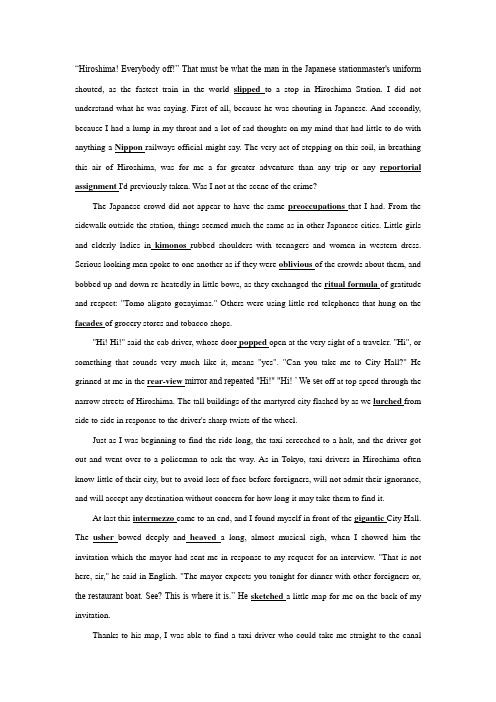
“Hiroshima! Everybody off!” That must be what the man in the Japanese stationmaster's uniform shouted, as the fastest train in the world slipped to a stop in Hiroshima Station. I did not understand what he was saying. First of all, because he was shouting in Japanese. And secondly, because I had a lump in my throat and a lot of sad thoughts on my mind that had little to do with anything a Nippon railways official might say. The very act of stepping on this soil, in breathing this air of Hiroshima, was for me a far greater adventure than any trip or any reportorial assignment I'd previously taken. Was I not at the scene of the crime?The Japanese crowd did not appear to have the same preoccupations that I had. From the sidewalk outside the station, things seemed much the same as in other Japanese cities. Little girls and elderly ladies in kimonos rubbed shoulders with teenagers and women in western dress. Serious looking men spoke to one another as if they were oblivious of the crowds about them, and bobbed up and down re-heatedly in little bows, as they exchanged the ritual formula of gratitude and respect: "Tomo aligato gozayimas." Others were using little red telephones that hung on the facades of grocery stores and tobacco shops."Hi! Hi!" said the cab driver, whose door popped open at the very sight of a traveler. "Hi", or something that sounds very much like it, means "yes". "Can you take me to City Hall?" He grinned at me in the rear-view mirror and repeated "Hi!" "Hi! ’ We se t off at top speed through the narrow streets of Hiroshima. The tall buildings of the martyred city flashed by as we lurched from side to side in response to the driver's sharp twists of the wheel.Just as I was beginning to find the ride long, the taxi screeched to a halt, and the driver got out and went over to a policeman to ask the way. As in Tokyo, taxi drivers in Hiroshima often know little of their city, but to avoid loss of face before foreigners, will not admit their ignorance, and will accept any destination without concern for how long it may take them to find it.At last this intermezzo came to an end, and I found myself in front of the gigantic City Hall. The usher bowed deeply and heaved a long, almost musical sigh, when I showed him the invitation which the mayor had sent me in response to my request for an interview. "That is not here, sir," he said in English. "The mayor expects you tonight for dinner with other foreigners or, the restaurant boat. See? This is where it is.” He sketched a little map for me on the back of my invitation.Thanks to his map, I was able to find a taxi driver who could take me straight to the canalembankment , where a sort of barge with a roof like one on a Japanese house was moored . The Japanese build their traditional houses on boats when land becomes too expensive. The rather arresting spectacle of little old Japan adrift adrift amid beige concrete skyscrapers is the very symbol of the incessant struggle between the kimono and the miniskirt.At the door to the restaurant, a stunning, porcelain-faced woman in traditional costume asked me to remove my shoes. This done, I entered one of the low-ceilinged rooms of the little floating house, treading cautiously on the soft matting and experiencing a twinge of embarrassment at the prospect of meeting the mayor of Hiroshima in my socks.He was a tall, thin man, sad-eyed and serious. Quite unexpectedly, the strange emotion which had overwhelmed me at the station returned, and I was again crushed by the thought that I now stood on the site of the first atomic bombardment, where thousands upon thousands of people had been slain in one second, where thousands upon thousands of others had lingered on to die in slow agony .The introductions were made. Most of the guests were Japanese, and it was difficult for me to ask them just why we were gathered here. The few Americans and Germans seemed just as inhibited as I was. "Gentlemen," said the mayor, "I am happy to welcome you to Hiroshima."Everyone bowed, including the Westerners. After three days in Japan, the spinal column becomes extraordinarily flexible."Gentlemen, it is a very great honor to have you her e in Hiroshima."There were fresh bows, and the faces grew more and more serious each time the name Hiroshima was repeated."Hiroshima, as you know, is a city familiar to everyone,” continued the mayor."Yes, yes, of course,” murmured the company, more and more agitated."Seldom has a city gained such world renown, and I am proud and happy to welcome you to Hiroshima, a town known throughout the world for its--- oysters".I was just about to make my little bow of assent, when the meaning of these last words sank in, jolting me out of my sad reverie ."Hiroshima –oysters? What about the bomb and the misery and humanity's most heinous crime?" While the mayor went on with his speech in praise of southern Japanese sea food, I cautiously backed away and headed toward the far side of the room, where a few men were talkingamong themselves and paying little attention to the mayor's speech. "You look puzzled," said a small Japanese man with very large eye-glasses."Well, I must confess that I did not expect a speech about oysters here. I thought that Hiroshima still felt the impact of the atomic impact .""No one talks about it any more, and no one wants to, especially, the people who were born here or who lived through it. "Do you feel the same way, too?""I was here, but I was not in the center of town. I tell you this because I am almost an old man. There are two different schools of thought in this city of oysters, one that would like to preserve traces of the bomb, and the other that would like to get rid of everything, even the monument that was erected at the point of impact. They would also like to demolish the atomic museum.""Why would they want to do that?""Because it hurts everybody, and because time marches on. That is why." The small Japanese man smiled, his eyes nearly closed behind their thick lenses. "If you write about this city, do not forget to say that it is the gayest city in Japan, even it many of the town's people still bear hidden wounds, and burns."Like any other, the hospital smelled of formaldehyde and ethere . Stretchers and wheelchairs lined the walls of endless corridors, and nurses walked by carrying Stretchers instruments, the very sight of which would send shivers down the spine of any healthy visitor. The so-called atomic section was located on the third floor. It consisted of 17 beds."I am a fisherman by trade. I have been here a very long time, more than twenty years, "said an old man in Japanese pajamas. “What is wrong with you?”"Something inside. I was in Hiroshima when it happened. I saw the fire ball. But I had no burns on my face or body. I ran all over the city looking for missing friends and relatives. I thought somehow I had been spared. But later my hair began to fall out, and my belly turned to water. I felt sick, and ever since then they have been testing and treating me. " The doctor at my side explained and commented upon the old man's story, "We still hare a handful of patients here who are being kept alive by constant car e. The other s died as a result of their injuries, or else committed suicide . ""Why did they commit suicide?""It is humiliating to survive in this city. If you bear any visible scars of atomic burns, your children will encounter prejudice on the par t of those who do not. No one will marry the daughter or the niece of an atomic bomb victim. People are afraid of genetic damage from the radiation." The old fisherman gazed at me politely and with interest.Hanging over the patient was a big ball made of bits of brightly colored paper, folded into the shape of tiny birds. "What's that?" I asked."Those are my lucky birds. Each day that I escape death, each day of suffering that helps to free me from earthly cares, I make a new little paper bird, and add it to the others. This way I look at them and congratulate myself of the good fortune that my illness has brought me. Because, thanks to it, I have the opportunity to improve my character."Once again, outside in the open air, I tore into little pieces a small notebook with questions that I'd prepared in advance for inter views with the patients of the atomic ward. Among them was the question: Do you really think that Hiroshima is the liveliest city in Japan? I never asked it. But I could read the answer in every eye.“广岛到了!大家请下车!”当世界上最快的高速列车减速驶进广岛车站并渐渐停稳时,那位身着日本火车站站长制服的男人口中喊出的一定是这样的话。
(完整版)高级英语第二册课文翻译

高级英语第二册课文翻译Unit1 Pub Talk and the King's English酒吧闲聊与标准英语亨利?费尔利人类的一切活动中,只有闲谈最宜于增进友谊,而且是人类特有的一种活动。
动物之间的信息交流,不论其方式何等复杂,也是称不上交谈的。
闲谈的引人人胜之处就在于它没有一个事先定好的话题。
它时而迂回流淌,时而奔腾起伏,时而火花四射,时而热情洋溢,话题最终会扯到什么地方去谁也拿不准。
要是有人觉得“有些话要说”,那定会大煞风景,使闲聊无趣。
闲聊不是为了进行争论。
闲聊中常常会有争论,不过其目的并不是为了说服对方。
闲聊之中是不存在什么输赢胜负的。
事实上,真正善于闲聊的人往往是随时准备让步的。
也许他们偶然间会觉得该把自己最得意的奇闻轶事选出一件插进来讲一讲,但一转眼大家已谈到别处去了,插话的机会随之而失,他们也就听之任之。
或许是由于我从小混迹于英国小酒馆的缘故吧,我觉得酒瞎里的闲聊别有韵味。
酒馆里的朋友对别人的生活毫无了解,他们只是临时凑到一起来的,彼此并无深交。
他们之中也许有人面临婚因破裂,或恋爱失败,或碰到别的什么不顺心的事儿,但别人根本不管这些。
他们就像大仲马笔下的三个火枪手一样,虽然日夕相处,却从不过问彼此的私事,也不去揣摸别人内心的秘密。
有一天晚上的情形正是这样。
人们正漫无边际地东扯西拉,从最普通的凡人俗事谈到有关木星的科学趣闻。
谈了半天也没有一个中心话题,事实上也不需要有一个中心话题。
可突然间大伙儿的话题都集中到了一处,中心话题奇迹般地出现了。
我记不起她那句话是在什么情况下说出来的——她显然不是预先想好把那句话带到酒馆里来说的,那也不是什么非说不可的要紧话——我只知道她那句话是随着大伙儿的话题十分自然地脱口而出的。
“几天前,我听到一个人说‘标准英语’这个词语是带贬义的批评用语,指的是人们应该尽量避免使用的英语。
”此语一出,谈话立即热烈起来。
有人赞成,也有人怒斥,还有人则不以为然。
高级英语第二册课文翻译
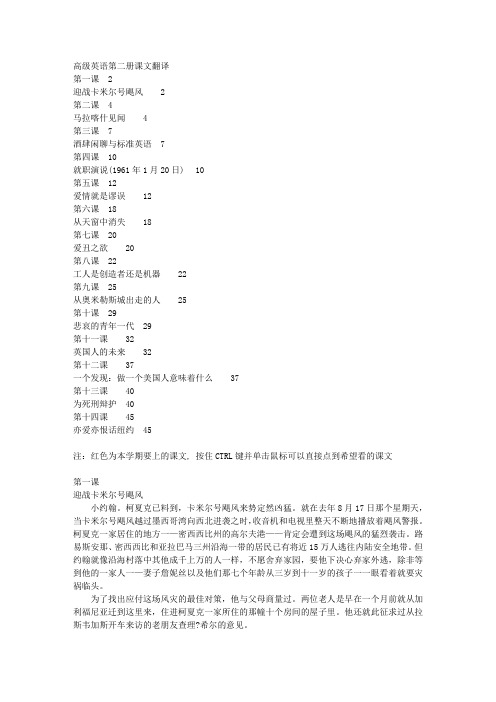
高级英语第二册课文翻译第一课 2迎战卡米尔号飓风 2第二课 4马拉喀什见闻 4第三课7酒肆闲聊与标准英语7第四课10就职演说(1961年1月20日) 10第五课12爱情就是谬误12第六课18从天窗中消失18第七课20爱丑之欲20第八课22工人是创造者还是机器22第九课25从奥米勒斯城出走的人25第十课29悲哀的青年一代29第十一课32英国人的未来32第十二课37一个发现:做一个美国人意味着什么37第十三课40为死刑辩护40第十四课45亦爱亦恨话纽约45注:红色为本学期要上的课文, 按住CTRL键并单击鼠标可以直接点到希望看的课文第一课迎战卡米尔号飓风小约翰。
柯夏克已料到,卡米尔号飓风来势定然凶猛。
就在去年8月17日那个星期天,当卡米尔号飓风越过墨西哥湾向西北进袭之时,收音机和电视里整天不断地播放着飓风警报。
柯夏克一家居住的地方一—密西西比州的高尔夫港——肯定会遭到这场飓风的猛烈袭击。
路易斯安那、密西西比和亚拉巴马三州沿海一带的居民已有将近15万人逃往内陆安全地带。
但约翰就像沿海村落中其他成千上万的人一样,不愿舍弃家园,要他下决心弃家外逃,除非等到他的一家人一—妻子詹妮丝以及他们那七个年龄从三岁到十一岁的孩子一一眼看着就要灾祸临头。
为了找出应付这场风灾的最佳对策,他与父母商量过。
两位老人是早在一个月前就从加利福尼亚迁到这里来,住进柯夏克一家所住的那幢十个房间的屋子里。
他还就此征求过从拉斯韦加斯开车来访的老朋友查理?希尔的意见。
约翰的全部产业就在自己家里(他开办的玛格纳制造公司是设计、研制各种教育玩具和教育用品的。
公司的一切往来函件、设计图纸和工艺模具全都放在一楼)。
37岁的他对飓风的威力是深有体会的。
四年前,他原先拥有的位于高尔夫港以西几英里外的那个家就曾毁于贝翠号飓风(那场风灾前夕柯夏克已将全家搬到一家汽车旅馆过夜)。
不过,当时那幢房子所处的地势偏低,高出海平面仅几英尺。
“我们现在住的这幢房子高了23英尺,,’他对父亲说,“而且距离海边足有250码远。
高级英语第二册课后翻译
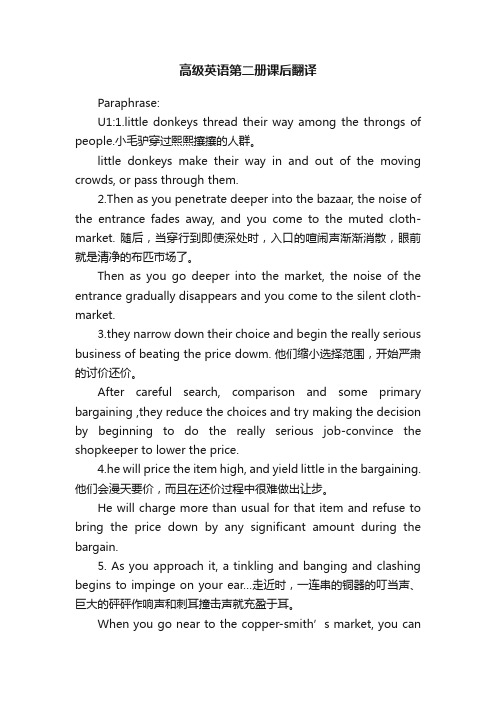
高级英语第二册课后翻译Paraphrase:U1:1.little donkeys thread their way among the throngs of people.小毛驴穿过熙熙攘攘的人群。
little donkeys make their way in and out of the moving crowds, or pass through them.2.Then as you penetrate deeper into the bazaar, the noise of the entrance fades away, and you come to the muted cloth-market. 随后,当穿行到即使深处时,入口的喧闹声渐渐消散,眼前就是清净的布匹市场了。
Then as you go deeper into the market, the noise of the entrance gradually disappears and you come to the silent cloth-market.3.they narrow down their choice and begin the really serious business of beating the price dowm. 他们缩小选择范围,开始严肃的讨价还价。
After careful search, comparison and some primary bargaining ,they reduce the choices and try making the decision by beginning to do the really serious job-convince the shopkeeper to lower the price.4.he will price the item high, and yield little in the bargaining.他们会漫天要价,而且在还价过程中很难做出让步。
高级英语第二次课文需背诵翻译部分原文+译文
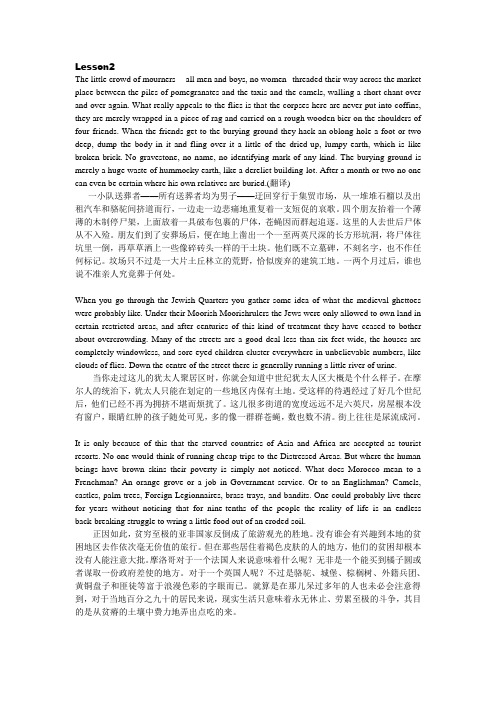
Lesson2The little crowd of mourners -- all men and boys, no women--threaded their way across the market place between the piles of pomegranates and the taxis and the camels, walling a short chant over and over again. What really appeals to the flies is that the corpses here are never put into coffins, they are merely wrapped in a piece of rag and carried on a rough wooden bier on the shoulders of four friends. When the friends get to the burying-ground they hack an oblong hole a foot or two deep, dump the body in it and fling over it a little of the dried-up, lumpy earth, which is like broken brick. No gravestone, no name, no identifying mark of any kind. The burying-ground is merely a huge waste of hummocky earth, like a derelict building-lot. After a month or two no one can even be certain where his own relatives are buried.(翻译)一小队送葬者——所有送葬者均为男子——迂回穿行于集贸市场,从一堆堆石榴以及出租汽车和骆驼间挤道而行,一边走一边悲痛地重复着一支短促的哀歌。
高英第二册翻译
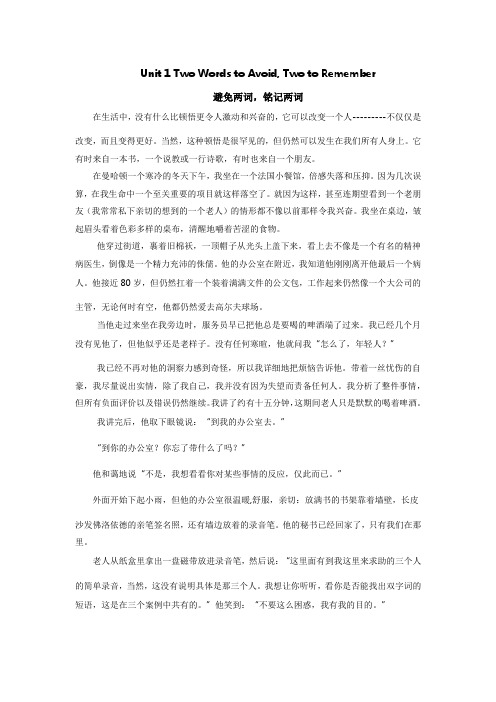
Unit 1 Two Words to Avoid, Two to Remember避免两词,铭记两词在生活中,没有什么比顿悟更令人激动和兴奋的,它可以改变一个人---------不仅仅是改变,而且变得更好。
当然,这种顿悟是很罕见的,但仍然可以发生在我们所有人身上。
它有时来自一本书,一个说教或一行诗歌,有时也来自一个朋友。
在曼哈顿一个寒冷的冬天下午,我坐在一个法国小餐馆,倍感失落和压抑。
因为几次误算,在我生命中一个至关重要的项目就这样落空了。
就因为这样,甚至连期望看到一个老朋友(我常常私下亲切的想到的一个老人)的情形都不像以前那样令我兴奋。
我坐在桌边,皱起眉头看着色彩多样的桌布,清醒地嚼着苦涩的食物。
他穿过街道,裹着旧棉袄,一顶帽子从光头上盖下来,看上去不像是一个有名的精神病医生,倒像是一个精力充沛的侏儒。
他的办公室在附近,我知道他刚刚离开他最后一个病人。
他接近80岁,但仍然扛着一个装着满满文件的公文包,工作起来仍然像一个大公司的主管,无论何时有空,他都仍然爱去高尔夫球场。
当他走过来坐在我旁边时,服务员早已把他总是要喝的啤酒端了过来。
我已经几个月没有见他了,但他似乎还是老样子。
没有任何寒暄,他就问我“怎么了,年轻人?”我已经不再对他的洞察力感到奇怪,所以我详细地把烦恼告诉他。
带着一丝忧伤的自豪,我尽量说出实情,除了我自己,我并没有因为失望而责备任何人。
我分析了整件事情,但所有负面评价以及错误仍然继续。
我讲了约有十五分钟,这期间老人只是默默的喝着啤酒。
我讲完后,他取下眼镜说:“到我的办公室去。
”“到你的办公室?你忘了带什么了吗?”他和蔼地说“不是,我想看看你对某些事情的反应,仅此而已。
”外面开始下起小雨,但他的办公室很温暖,舒服,亲切:放满书的书架靠着墙壁,长皮沙发佛洛依德的亲笔签名照,还有墙边放着的录音笔。
他的秘书已经回家了,只有我们在那里。
老人从纸盒里拿出一盘磁带放进录音笔,然后说:“这里面有到我这里来求助的三个人的简单录音,当然,这没有说明具体是那三个人。
- 1、下载文档前请自行甄别文档内容的完整性,平台不提供额外的编辑、内容补充、找答案等附加服务。
- 2、"仅部分预览"的文档,不可在线预览部分如存在完整性等问题,可反馈申请退款(可完整预览的文档不适用该条件!)。
- 3、如文档侵犯您的权益,请联系客服反馈,我们会尽快为您处理(人工客服工作时间:9:00-18:30)。
高英翻译第一课1.动物之间的信息交流,不论其方式何等复杂,也是称不上交谈的。
2.闲聊中常常会有争论,不过其目的并不是为了说服对方。
闲聊之中是不存在什么输赢胜负的。
3.或许是由于我从小混迹于英国小酒馆的缘故吧,我觉得酒瞎里的闲聊别有韵味。
4.我记不起她那句话是在什么情况下说出来的——她显然不是预先想好把那句话带到酒馆里来说的,那也不是什么非说不可的要紧话——我只知道她那句话是随着大伙儿的话题十分自然地脱口而出的。
5.每当上流社会想给“规范英语”制订一些条条框框时,总会遭到下层人民的抵制。
6.词语本身并不是现实,它不过是用以表达现实的一种形式而已。
标准英语就像诺曼底人的盎格鲁法语一样,也是一个阶级用来表达现实的一种形式。
7.让人们学着去讲也许不错,但既不应当把它作为法令,也不应当使它完全不接受来自下层的改变。
8.要是有谁闲聊时也像做文章一样句逗分明,或者像写一篇要发表的散文一样咬文嚼字的话,那他讲起话来就一定会极为倒人胃口。
9.看到E·M·福斯特笔下写出“当今这个时代的阴森可怖的长廊”时,其用语之生动及由其所产生的生动有力、甚至可怖的形象令我们拍案叫绝。
10.那天晚上,如果我们当场弄清了“标准英语”的意义,也就不可能再有那一场交谈论辩。
第二课1.当你徒步走过这样的城镇——在20万当地居民中,至少有2万人除了罩在身上的一身破布之外,其他一无所有——当你看到这些人如何生存,又如何轻易地死去时,你永远难以相信自己是在人类当中穿行。
2.当你经过犹太人居住区时,你就可能会了解中世纪的犹太人区大概是个什么样子。
3.这儿的许多街道还不及六英尺宽;而房子则没有窗户;眼睛红肿的孩子成群结队,像一群群的苍蝇,四处可见,多得令人难以置信。
4.甚至一位盲人也从铺子后面爬了出来,手在空中胡乱摸索着。
5.啊,那只不过是装装样子。
他们其实都是放债的债主。
6.想想与这相同的一幕吧:好几百年前,常有些可怜的老妇人因为拥有巫术而被烧死,但她们却甚至没办法利用自己的巫术让自己饱餐一顿。
7.人们可以看到干巴巴的土地、仙人掌、棕榈树,还有远处连绵的群山,唯独看不到在地里耕作的农夫。
8.摩洛哥的大部分土地都荒无人烟,能够在这里侥幸存活的野生动物没有比野兔更大的。
9.除了罕见的暴风雨过后的一两天之外,其余时间这里都缺水。
10.在原始社会里,妇女们到达一定年龄后,身材通常都会缩成孩子般大小。
第三课1.我们今天举行的不是一个政党的祝捷大会,而是一次自由的庆典。
这是一个承先启后、继往开来的大事件。
2.此时此地我谨向我们的朋友,同时也向我们的敌人宣告:火炬已传到我们新一代美国人手中。
这一代人在本世纪成长起来,经受过战火的锻炼,经历过冷峻的和平的考验,以珍视古老的传统而自豪,又决不愿坐视或容许人权逐渐遭到践踏。
美国对这些人权一向负有责任,今天我们也正在本国及全世界范围内为之奋斗。
3.必须让每一个友邦和敌国都知道:为维护自由,使其长存不灭,我们将会不惜付出任何代价,肩负任何重担,迎战一切困难,援助一切朋友,反击一切敌人。
4.只要我们团结起来,我们在许多合作性事业中就会无往而不胜。
5.而一旦彼此分裂,我们就会无所作为。
因为我们之间若起争端,彼此离异,便难以与我们面临的强大对手抗衡。
6.一个自由社会如若不能帮助众多的穷人,也就无法保全少数的富人。
7.我们不敢以示弱去诱惑他们。
因为只有当我们有了无可置疑的足够的武力时,我们才能有无可置疑的把握避免使用武力。
8.同胞们,我们事业的成败关键不仅仅是握在我的手中,更大一部分是握在你们手中。
9.如今那号角又在召唤我们了。
它不是在号召我们扛起武器一一尽管我们也需要武器,不是在号召我们去参战——尽管我们也准备应战,而是在号召我们肩负起一场长期的艰苦斗争的重任,年复一年,“忍受困苦,向往未来”,为反对人类共同的敌人——暴政、贫困、疾病以及战争本身——而斗争。
10.良心是我们唯一可靠的报酬,历史是我们所作所为的最后裁判。
让我们迈步向前,去领导我们所热爱的国家吧,我们祈求上帝的保佑和帮助,但我们知道,上帝在人间的工作就是我们自己的工作。
第四课1.我的大脑像发电机一样发达,孳化学家的天平一样精确,像手术刀一样锋利。
2.见到一种新鲜的东西就跟着学,以为别人都在那么干,自己也就卷进去傻干——这在我看来,简直愚蠢至极。
3.我要特别说明的是,我想得到这妙龄少女并不是由于感情的驱使。
4.无论如何可以试一试,使一个漂亮的笨姑娘变得聪明比使一个聪明的丑姑娘变得漂亮毕竟要容易些。
5.他神情不安,用面包店窗前的流浪儿那种馋涎欲滴的神情望着那件皮大衣,接着扭过头去,坚定地咬紧牙关。
6.说不定她头脑里的死火山口中的什么地方,还有些火星会喷射出来呢。
7.毕竟外科医生在做手术时可以看X光片,律师在审案时可以看案由,木匠在造房子时可以看蓝图。
8.如果居里夫人不是碰巧把一张照相底片放在装有一块沥清铀矿石的抽屉里,那么世人今天就不会知道镭。
9.突然,一道智慧的光芒——这是我从未看到过的一一闪现在她的眼中。
10.看到波利并不那么傻,我的劲头上来了。
于是,我便开始把对她讲过的一切,长时间地、耐心地复习了一遍。
第五课1.二十年代社会生活的各个方面中,被人们评论得最多、渲染得最厉害的,莫过于青年一代的叛逆之行了。
2.对这类问题的回答必然只能是既“对”又“不对”——说“对,,是因为人的成长过程中一贯就存在着所谓青年一代的问题;说“不对”是因为在当时的社会看来似乎是那么狂野。
那么不负责任,那么不讲道德的行为,若是用今天的正确眼光去看的话,却远远没有今天的一些迷恋爵士乐的狂荡青年的堕落行为那么耸人听闻。
3.不论是否发生战争,随着时代的变化,要我们的年轻一代接受与他们必须在其中拼搏求胜的这个喧嚣的商业化社会格格不入的行为准则已经变得越来越难了。
4.追求时尚,为了短暂的快乐和一时的新奇而大肆挥霍,纵情地狂欢,寻求各种各样的感官刺激——性行为,吸毒,酗酒以及各种各样的堕落行为——这些都是他们逃避责任的表现形式,是一种由社会的普遍繁荣及战后人们对于政治、经济限制和国际义务所产生的厌烦情绪所造成的逃避方式。
5.其时,真正的知识分子对此现象远远谈不上满意。
6.他们的笔尖下便喷射出愤怒的火花,猛烈抨击着美国社会中的唯物质主义以及他们所称的文化市侩习气。
7.正是在他们那抗争性的,而总的说来又是短暂的侨居欧洲期间,二十年代我国的那些主要作家开始认识到自己一一用格特鲁德.斯坦的话说一一就是所谓“迷惘的一代”。
8.“迷惘的一代”本身虽不是一场什么文学运动,但那些“迷惘的一代”的作家的态度却是那个时代文学作品的共同特征。
9.在一段时间里,他们曾有过惊愕、孤独无依的感觉,因而变得痛苦、尖刻,以至于反社会、反权威、好标新立异,其行为往往有些荒唐,更常常近于胡闹——但却从来“迷惘过”。
10.二十年代的知识分子,也就是F司各特菲茨杰拉德所称的“悲哀的青年一代”,诅咒过自己的命运,但并没有消亡;他们曾试图逃避现实,但又自动回到现实中来;他们痛责美国社会的市侩,但对自己的祖国却又充满热爱。
正是在这样的过程中,他们创作出了美国文学史上最富有生气、最令人耳目一新、最激动人心的文学作品。
第六课1.那些赞美“大苹果”的广告活动,还有那些印着带有“我爱纽约”字样的心形图案的T恤衫,只不过是它们在绝望中发出悲哀的迹象,只不过是纽约这个非凡的城市日趋衰落的象征。
2.今日的纽约非但常常跟不上美国政治前进的步伐,而且往往也合不上美国人生活情趣变化的节拍。
3.有十多座其他城市都已经有了一些在建筑艺术上很富有创造性的建筑物,而纽约最近二十年来所造的任何一幢建筑物都不能与之相比。
4.纽约从来都不是召集会议的好场所——因为那儿不友好,不安全,人口拥挤,消费高昂——但现在它似乎正在一定程度上争回其作为旅游胜地的地位。
5.他们比大多数美国人更欣赏纽约这个国际大都市的五彩缤纷的生活,它那残存的、独此一家的欧洲社会准则以及它那众多外来民族混杂而居的社会。
6.但总的说来,我倒还想不出这世界上有多少个地方我更愿意去居住。
7.这里已经不是什么静谧的公园了,倒更像是一个乱哄哄的狂欢场所。
8.今天仍有许多青年被吸引到纽约来,因为他们想考验一下自己,怕让自己的才能沦为极其平庸而易于上市的商品。
9.那些初来纽约的人早晚有一天会找到或形成他们自己的小圈子。
曼哈顿有许多这类小圈子,密密麻麻地挤在一起,但彼此之间却极少往来。
10.新来者永远不会被完全同化。
只是不稳定地加入到未被消化的多数中去。
Unit71,市区的大街小巷上,一支支游行队伍穿过街道两旁那一排排红顶彩漆墙面的房屋,穿过一座座长满青苔的古老庭园,走过一条条林荫大道,一座座公园和公共建筑,迤逦而行。
2,所有游行队伍都沿着蜿蜒曲折的街道迤逦向北行进,来到一个称作绿野的大草坪上。
草坪上早有一些光着身子、脚踝沾满泥巴、手臂长大而灵活的青年男女在那儿对他们的劣马进行赛前训练。
3,听到这样的描述,人们也许就会意想到那君临天下的国王,骑在一匹高头大马上,身边簇拥着一群威武的骑士,或是踞坐在一乘由一队健壮如牛的奴隶抬着的金轿上。
4,我们的社会的弊病在于,由于一些卖弄学问的人和深谙世故的人的推波助澜,我们养成了一种恶习,认为欢乐是一种无聊乏味的东西.5,可是,赞美绝望即等于消灭欢乐,拥抱暴力即意味着丧失一切。
6,使奥米勒斯人心中充满欢乐和自豪的是一种巨大无边的满足感,是一种巨大的胜利的喜悦,但这胜利不是指击败外敌的胜利,而是指自己心灵上与一切美好的心灵以及光辉灿烂的自然世界产生共鸣的胜利。
他们所庆祝的胜利是人生的胜利。
7,这似乎成了一个信号,片刻寂静之后,立刻便听到起跑线附近的一个亭子里响起了一阵威严、低沉、尖锐的号声。
8,所有的奥米勒斯人都知道他(她)在那儿。
有些人还去看过他(她)还有些人则觉得没必要亲自去看,知道他(她)在那儿就够了。
大家都明白他(她)必须呆在那儿。
至于他(她)为什么必须呆在那儿,这原因就只有一部分才明白,有些人并不知晓。
但所有的人都清楚一个道理:他们的幸福生活,他们城市的美景,他们之间的亲爱和睦的关系,他们的孩子的健康成长,他们的学者们的智慧,他们的工人的技艺,甚至连他们那片天地里的风调雨顺、五谷丰登的繁荣景象,这一切全都有赖于那孩子所受的苦难。
9,假若能把那孩子弄出那个悲惨的地方,让他(她)重见天日,假若能把他(她)洗得干干净净,将他(她)喂得饱饱的,并让他(她)有个舒舒服服的睡觉的地方,那无疑是一件很好的事情。
但只要那样做了,奥米勒斯的一切,包括她的繁荣气象、美丽景色和欢乐生活等都会立刻化为乌有。
10,然而,正因为他们在自己的仁义之心经受考验时悲伤流泪,无可奈何地接受现实时悲愤难抑,他们的生活才如此光辉灿烂。
Unit 81,他们甚至比自己想象中的英国人还要不同,倒是同他们自己感觉中的英国人差不多。
